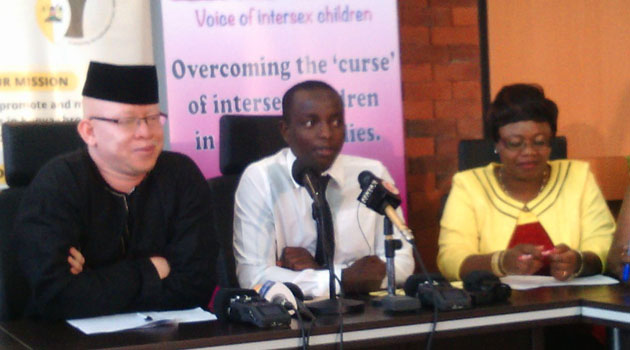
Twenty-five year old James Karanja (centre) who has the condition, explains vividly of the hardships he faces everyday in the quest to gain recognition and identity in the country/CFM NEWS
NAIROBI, Kenya, Oct 19 – Thousands of Kenyans born with intersex conditions continue to suffer in silence, having to bear the burden if not being recognised socially or legally under Kenyan laws.
Persons with the condition are mostly hidden and unaccounted for in the official census report.
Gamafrica Foundation’s Gathoni Muchomba said the challenges facing intersex people have resulted to many committing suicide due to prejudice from the society which lacks awareness and understanding of the condition.
“It is that bad that some of the kids at teenage level are committing suicide, I am most saddened with the death of two boys between the ages of 11 and 16 from Meru and Bungoma counties that committed suicide,” said Muchomba.
Intersex is a complex biological form where children are born with either two sex organs (male and female) or one visible organ while the other is hidden, malformed or deformed but present.
Child Rights International Network Conservatively estimates that there are 20,000 intersex people in Kenya.
Twenty-five year old James Karanja who has the condition, explains vividly of the hardships he faces everyday in the quest to gain recognition and identity in the country.
Karanja was pronounced a girl by doctors when born and was called Mary Waithera.
It wasn’t all joy and festivity to the family as his father later abandoned his mother upon knowing of the condition, leaving her with the task of taking care of him as an infant.
“When I was born, my father couldn’t tell whether I was a boy or a girl. He saw this as a curse and so took off,” said Karanja.
“After my father left, the community also stigmatised us by telling my mother that she was cursed which was evident by my birth,” said Karanja.
“The issue took a toll on my mother and as we speak she is currently admitted at the Mathare Hospital with a mental disorder,” he stated.
With no one to protect the family and Karanja in school, his mother was raped and as a result of the assault became expectant.
“My mother got sick because she couldn’t handle the pressure from the society all because of my condition, no one understood this taboo as they would call it, leave alone want to discuss it. No one wanted to be associated with us and so we had to fend for ourselves,” said the aggrieved Karanja.
Karanja lived his life as a girl and even attended a girl’s boarding school for his O-levels.
“I attended both primary and secondary school as a Girl. I used to wake up at 3am to take a shower so that my fellow students wouldn’t notice that my genitalia were different from theirs,” noted Karanja.
Things didn’t get any easier for him for many are the times he would be sent home on claims that he was a lesbian.
“Every now and then I would be sent away from school as teachers thought I was instigating lesbianism in school.”
With all the hardships, Karanja managed to score a B- in his Kenya Certificate for Secondary Examination (KSCE), sufficient enough to have him enrolled in a university.
But that wasn’t the case, as Karanja found it difficult to integrate with the community as people expected her to transition from a girl to a lady of which the opposite was what was taking place.
“My voice was deepening, I was more masculine and that’s when I realised the intensity of my condition.”
Since Karanja has now transitioned to a man, the challenge lies in changing his documentation which indicates his sex as female to male to enable him have access to the National Hospital Insurance Fund (NHIF), education, employment, and access to public services which all require one to clearly indicate their sex.
“I can’t get an Identification Card, a birth certificate because every time I go the registry they think I am an impersonator,” said Karanja.
Karanja is the voice of the many intersex persons who go through life’s struggle in silence.
Among the recommendations put forward by the Kenya National Commission on Human rights to Attorney General Githu Muigai is that of identifying an organ that’s tasked with generating a data system that will record the number of people with the intersex condition.
“People with the condition carry the task of proving their identity in a society that isn’t aware and lacks understanding of the condition,” said Commissioner Jedidah Waruhio.
Muchomba also highlighted on the need to amend the children’s act as well as other acts that affect intersexual children to accommodate their basic needs especially in legal recognition.
Other recommendations include:
The Department of registration of persons takes immediate administrative action to recognize the Intersex persons by adding a marker on birth notification and birth certificates.
The Ministry of education should appraise the National Assembly with information on the number of students who have dropped out of school because of their condition and what measures have been put in place to retain such children in school.
For the Inspector General of Police to ensure that human rights violations against intersex people are investigated, alleged perpetrators prosecuted and the victims receive redress.
The National Assembly through the committee to direct that the Registrar of Persons, Kenya Bureau of Statistics and the Ministry of Health provide statistics for all intersex persons, if not available to embark on measures that would ensure such statistics are captured.
Kenya will for the first time hold the inaugural recognition of the Intersex Awareness Day on October 26 to break the silence and create awareness and understanding on matters around Intersex children through the initiative dubbed “Let Me, Be Me”.









































